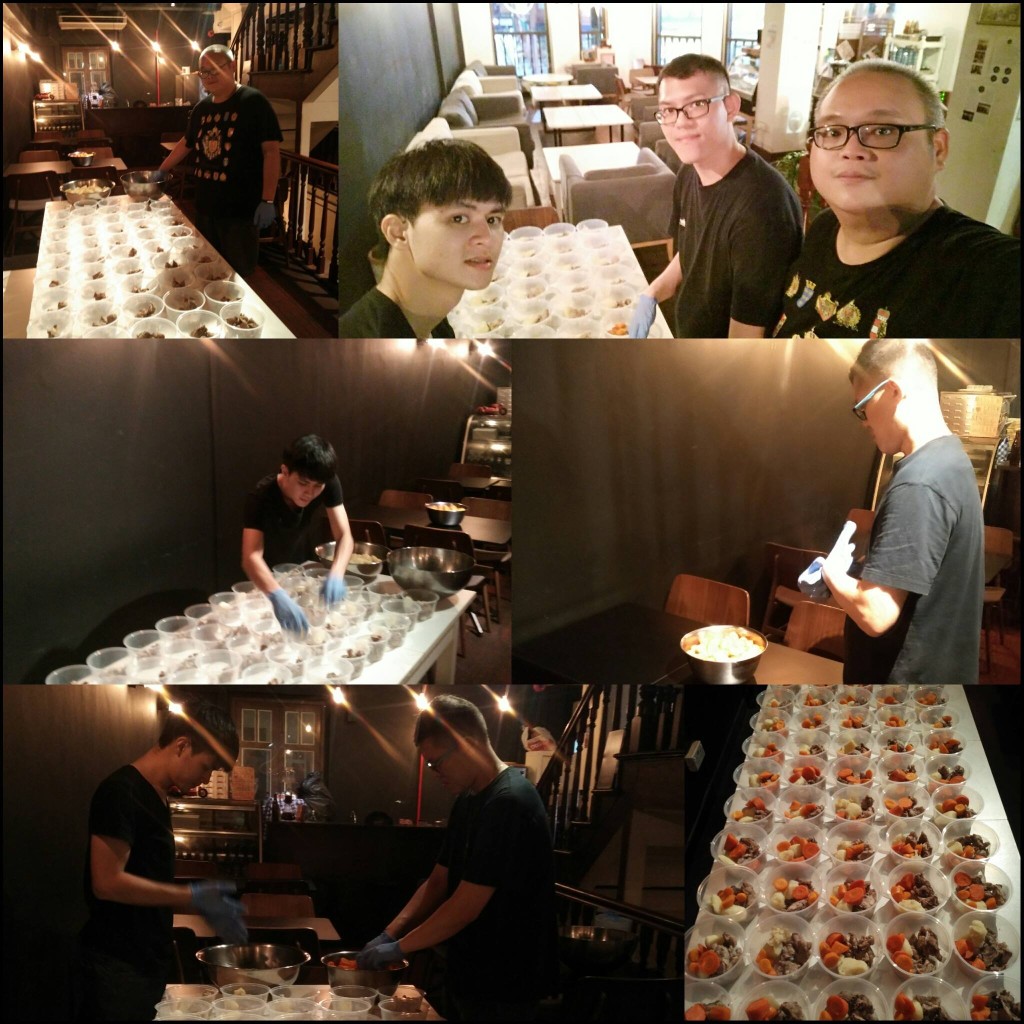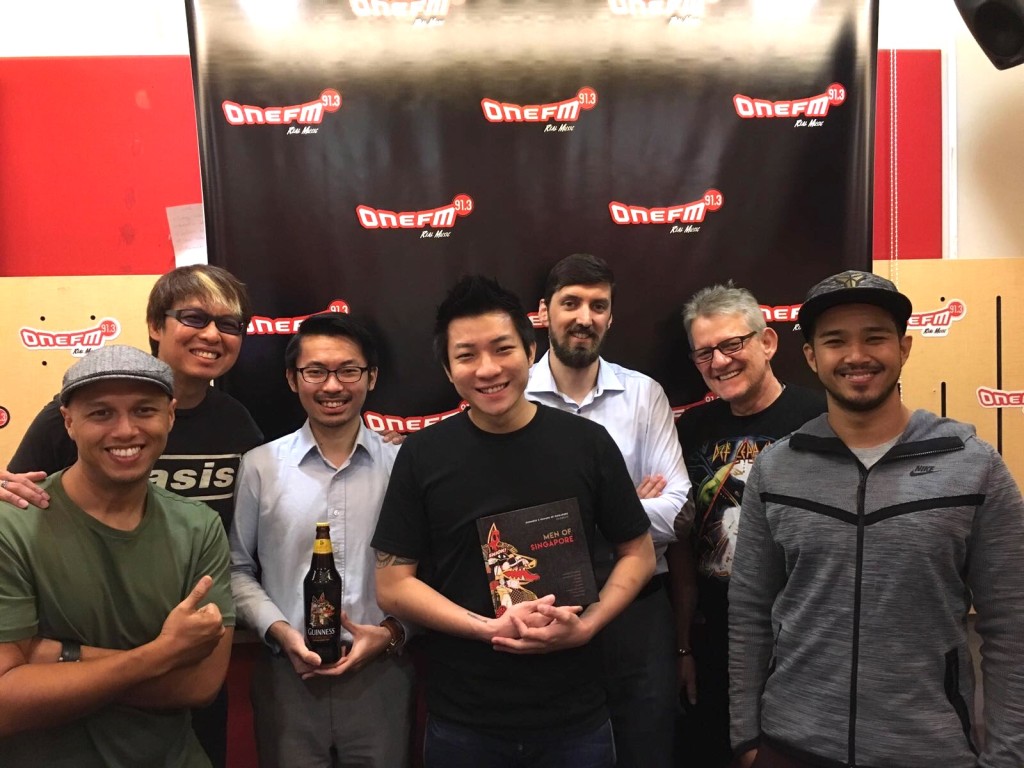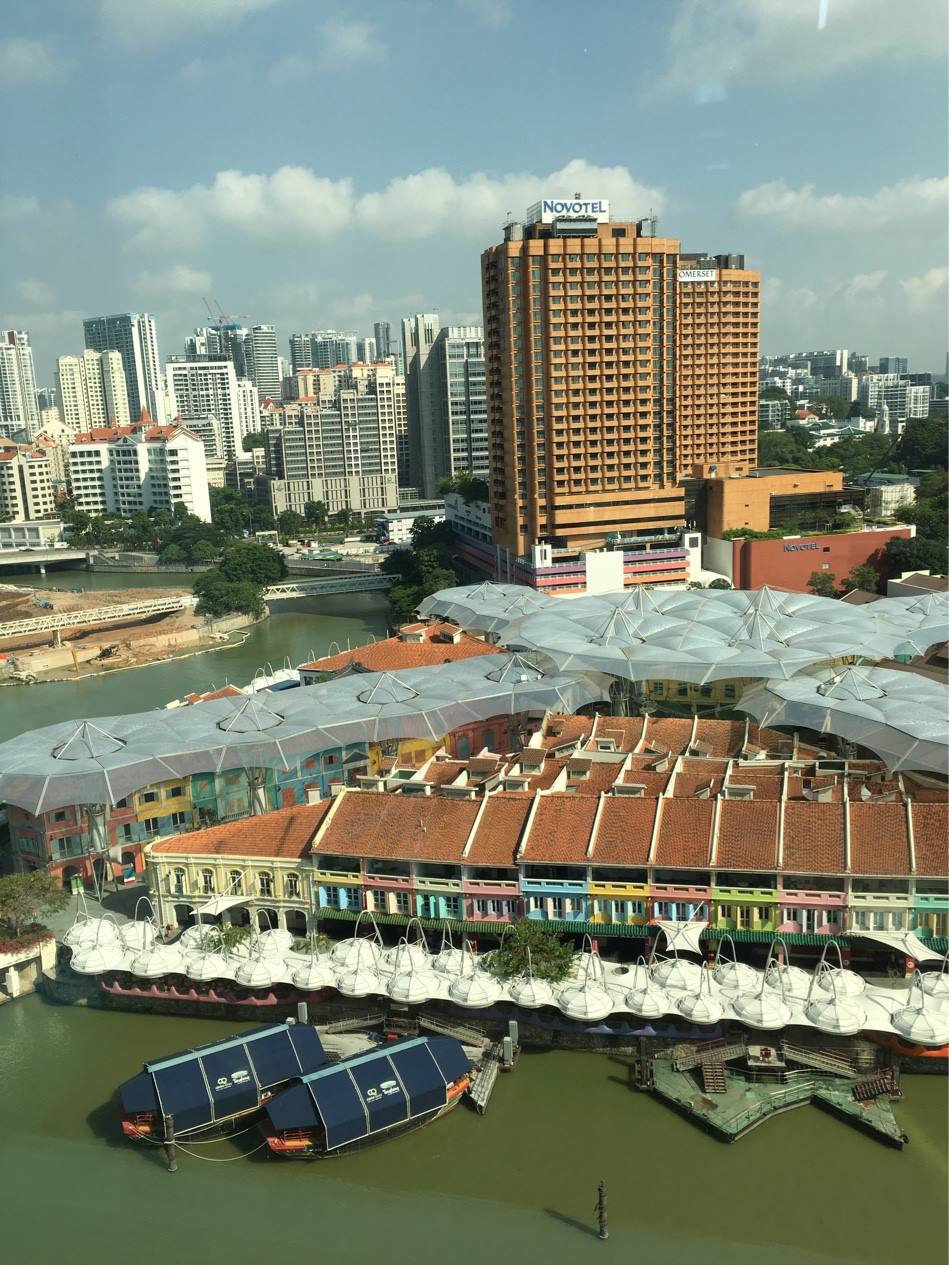Derrick Wong serves customers western bistro fare in his cafe every day and evening, and serves the homeless community residents in Chinatown zhap chai png and desserts on Monday and Friday nights.
Derrick runs The Loft Cafe in Chinatown, located at the intersection of Smith Street and South Bridge Road, on the second and third storey of a shophouse overlooking the colourful, lit-up Smith Street food walkway where tourists throng for (overpriced) local dishes. He is a co-partner in the cafe, oversees the daily operations, gets his hands dirty preparing food and serving customers, and manages backend aspects of the business as well. Throughout my conversation with him, he was interrupted several times by things calling for his attention. Customers to attend to. Food preparation. A turkey to carve for a private event on the cafe’s third storey for which he was preparing food just prior to our conversation. The cafe is a comfortable space for a chill Friday evening: dim Edison lamps, ambient lounge music and cosy couches.
He tells me that on Mondays, which are his rest days, he uses the cafe’s kitchen to prepare food for his homeless friends. Zhap chai png, mee rebus, and so on. He tries to include more meat into the dish because his homeless friends don’t often get to eat that much of it. Some other people give the homeless residents leftovers. It belittles their dignity, he says. He tries to give them something better. The money for the food comes from his own pocket. Some volunteers have also been pitching in with love gifts.
Every Monday and Friday night, he and his small group of volunteers would bring food and go out to Sago Lane, Smith Street and Chin Swee area at about 10pm and hang out with the homeless residents, sometimes until 3am. He’s been working with poor residents at the Jln Kukoh area since 2014, and only this year started reaching out to the Chinatown homeless. At first, the homeless residents were skeptical. Many other people doing charity to them would come and go. But it took time and persistence before they opened up and accepted Derrick and friends. It’s about honouring their promise that they would be there faithfully each week, he says. They now feel encouraged when they see Derrick and friends. When the haze turned severe this year, he started distributing ‘liang teh’. Frequent customers of the cafe joined them after he put the word out on their Facebook page.
The ministry extended organically to what he calls job therapy. Some homeless residents expressed interest in finding a job. So Derrick brought them in to the cafe to work for a couple of hours. Over the course of a few months, 6 of them tried out he cafe work. 1 stayed on as permanent part-timers staff. The rest left because they couldn’t really handle the lifestyle. He explained that many of the homeless residents were substance abuser. The elderly folks however were more positive. 2 of them worked at the cafe and picked up some skills–he taught them to make bread, for instance–and experience. As a result, they later landed jobs with the Sports Hub during the recent SEA games. This is what he calls job therapy. The homeless persons are properly paid the same rates as other part-time staff. It gives them experience, confidence and relational skills. Many of the homeless residents actually have rented houses but are on the streets because of relational problems with co-tenants of the houses. Homeless shelters feel like prisons to them because there are many restrictions, so they want out.
Why does he do all this? For one, it’s about the cafe business’ responsibility to the community. His partners and he started this cafe as not a charity but a missional business. It’s sustainable. It is socially responsible. And it manifests God to the people they encounter. He also shared that he’s an ex-convict. He has experienced social stigma. He knows what it feels like to be marginalised. But he’s been given a second chance. He hopes to offer the same to the homeless residents, many of whom also feel social ostracism. They look unhygienic. People shun them. People ask why they don’t work when they’re able bodied. But each of them, Derrick says, has a unique story. It’s not so simple. Get to know their stories instead.
Derrick previously went through a particular church’s School of Theology. As part of the programme, he volunteered with the dialect services. They’d load residents from the Jln Kukoh estate on a bus and send them to church, preach a message, pray with them, give them food and then send them back. He thinks there’s a problem with that. There’s no relationship with the residents. He says it’s about getting to know the individual persons. To know their needs, desires, hopes. So that strategic prayers can be offered. Sometimes, they lie about certain things. He says, you discern and you’ve got to make hard decisions about these things.
His ministry to the poor and the homeless has not always received endorsement. His former church didn’t support it. Maybe because it wouldn’t bring much benefits to the church, to put it bluntly. The church’s aim was to increase its membership. He didn’t agree with that. He stopped attending the church’s service after a while. He comments that local churches don’t have the environment for people like the homeless folks. Church members would probably see the homeless as ‘us’ and ‘them’. If Jesus is here today, He’d be out ministering to these people, Derrick says. Do Christians see ground-zero as church? Jesus went everywhere and saw ground-zero as church. He performed healing everywhere. For churches to be outward looking, they need to see where the needy are as church and not just ministry ground. Are church members willing to spend more time at ground-zero than in their church buildings? It’s the harvest field out there.
His ministry is enjoying more partnerships with other Christian community groups. There aren’t enough volunteers. So groups led by James Seow and Abraham Yeo team up with him. They have extended their reach to Chin Swee, from Jln Kukoh and Chinatown. I asked if he had the opportunity to share the gospel with any of the people he’s journeyed with. He says yes. “Chinatown I’m pretty surprised. Within half a year already. 7 salvations. First time round I brought 10 packets of food, couldn’t give out everything. Subsequently, get to know more of them, some of the more influential. They get to know us. They know us as the Jesus people. Brings comfort. Start to know they see us manifesting the God we trust.”
Given the multi-faceted needs of the community, what did he think about the government’s role? While he thinks the Singapore Government is doing a good job, he says some government agencies don’t understand the complexities of the needs these residents and households face. He notes that some of the Jln Kukoh residents approach their Member of Parliament (MP) and the MP does try to help. Sometimes, the homeless and the elderly try to find more ways to get more money from social services. Some people keep complaining, grumbling. They don’t want to work. Because they’re trapped in this vicious cycle. And that in turn is because there are too many barriers to escape the cycle. He explained that the estate comprises of 4 types of people: elderly, poor, single parents, and foreign brides. They have their own stories and problems. “You can’t expect the elderly to travel all the way to Woodlands to work and come back. Can’t expect single mom with two children at home to travel to Woodlands. And F&B and cleaning work have long hours.” As a result, many of the residents are not given opportunity to work. Companies and employers don’t offer the flexibility needed for these residents. Most businesses and employers are just looking at profits.
And he has a solution. He wants to start a social enterprise right inside Jln Kukoh, called “Walk Strong”, which is a direct translation of the estate’s name. Another social enterprise thought of this idea but they didn’t follow through with it because they found it practically unfeasible. But Derrick says to me matter-of-factly, with God it’s possible.
“We want to do manufacturing. Thinking of starting a central kitchen. Low entry level. Anyone can hop on. Catering. Bake bread. Gift packaging. We will have a Walk Strong brand. Approach hotels, companies. Offer competitive prices. But it helps the residents. These people can come in clock hours. Minimum is clock one hour. People say won’t work. But we have a massive manpower there. 7000 residents in Jln Kukoh. We haven’t done numbers, but numbers from SSO, 60% employable age.”
He says that he’s tried applying to the Housing Development Board (HDB) to offer discounted rates for rental of premises there. This is a social cause after all. HDB rejected his application. “They ask us to go through normal bidding process and rent could go up to $10,000 per month. Rent is expensive.”
More immediately, Derrick wants to do a census of the Jln Kukoh residents. He says the Government doesn’t do a full census of the estate. And they won’t want to release the information to him anyway because it’s confidential. Together with James Seow and Michelle Yeo (incidentally, all friends of mine), he has discussed possibilities of conducting this census. But they haven’t been able to proceed because they couldn’t find enough volunteers. There are 600 households, almost 7000 residents. The census has to be done within at least 10 months or otherwise, there’d be too much variation over a longer time period for meaningful data.
Properly appreciating the needs of the residents is important because, Derrick says, the ministries must meet tangible needs. “We experience parents who don’t care about their children. Just want to drink, take drugs. They tell their children don’t go school. When we fulfil their tangible needs, it helps the youth, the community to be more happy. My first impression when I first walked into Jln Kukoh is everyone’s so sad. Unlike in Toa Payoh, Ang Mo Kio, where people are alive, there, it’s a dead estate. People don’t smile. Whether the census amounts to the social enterprise [is] not important. It’s to know their needs. Present a more reliable plan that the government can look into.”
Taking a step back, he says, “never a single organisation can make a difference. But with every organisation, it can make a difference. Just imagine so many businesses in Chinatown. If they take time to walk around get to know these people, give them a second chance. You’ll see massive change in their lives.”
**
The Loft Cafe is at 268A South Bridge Road, 058817. It opens daily except Mondays from 7.30 am to 11pm.
For more stories of Christian social justice ministries, check out my book, The Justice Demand. To connect with Derrick or other social justice practitioners like him, drop me an email at thejusticedemand[at]gmail.com.





